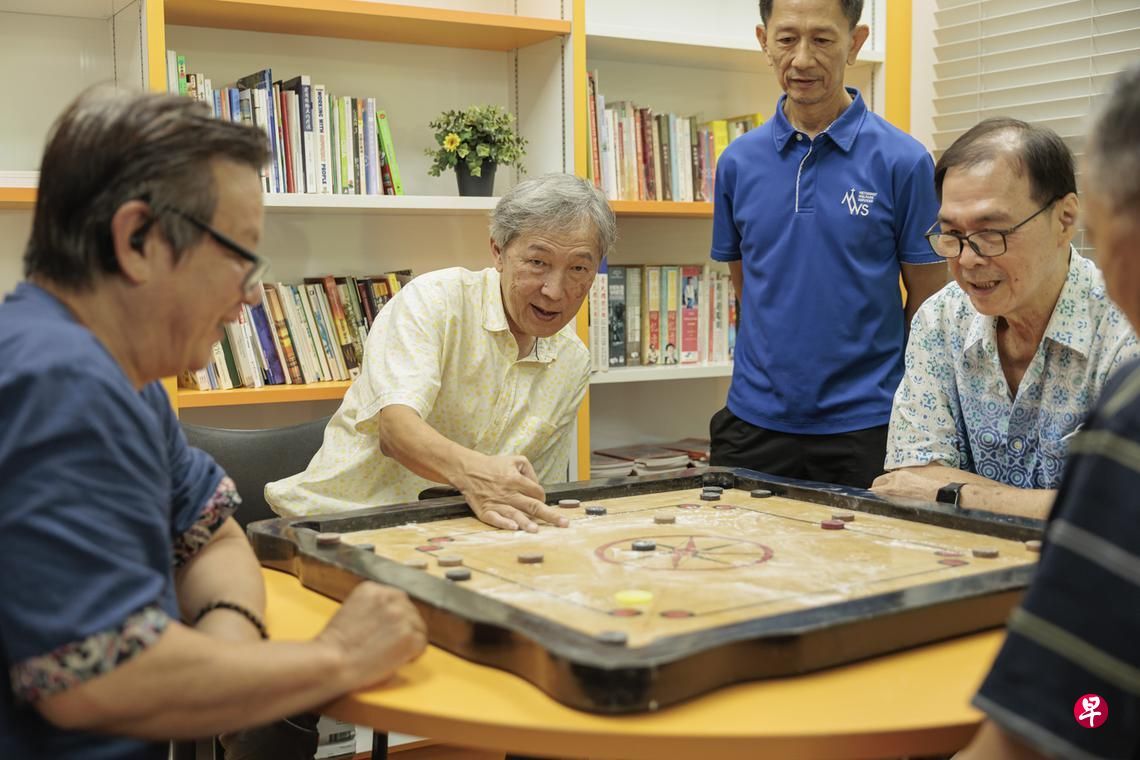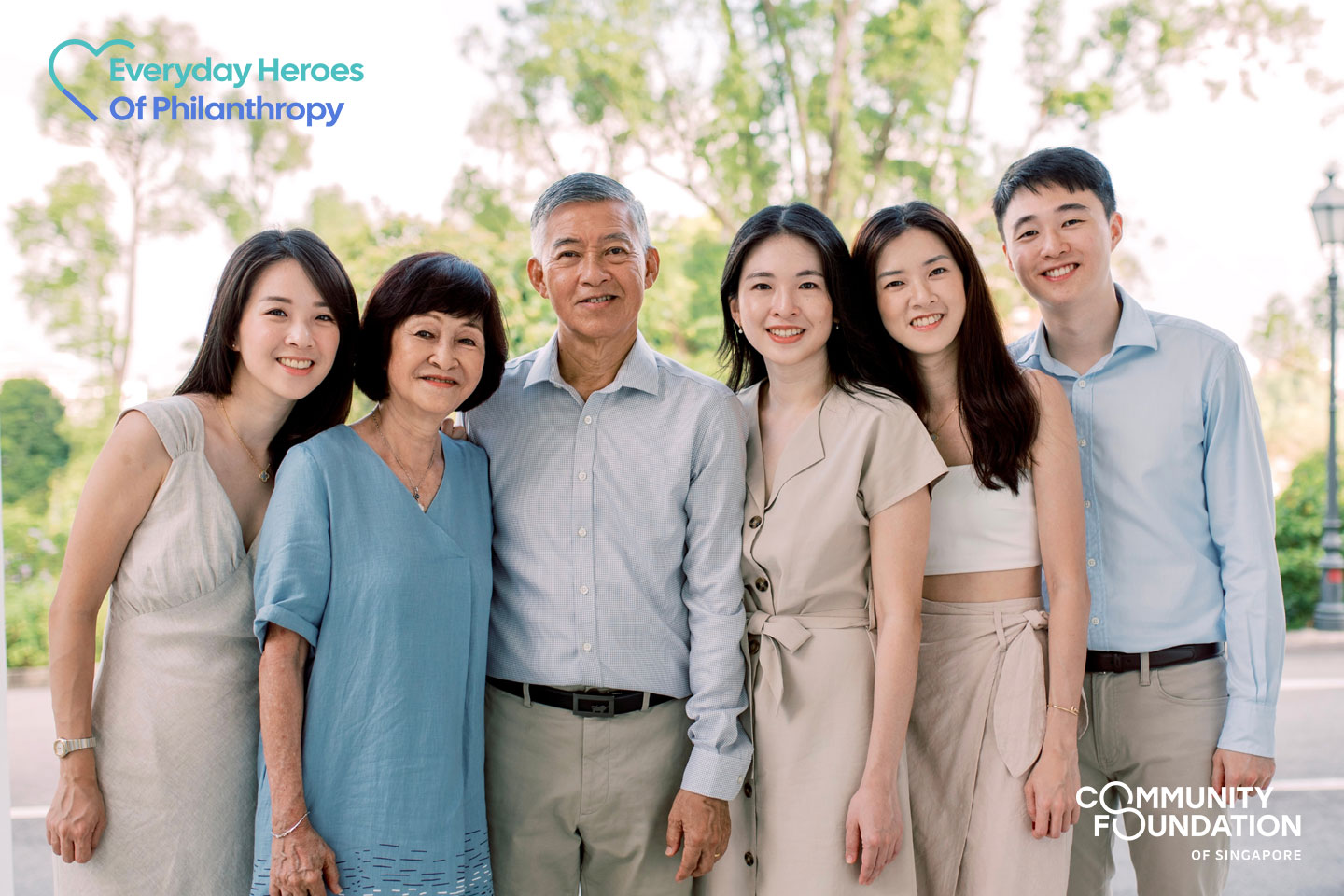Celebrating women who give in different ways


It is seldom that we honour the accomplishments of women who give their all without asking anything in return, whose humanitarianism managed to achieve great success against all odds.
International Women’s Day is one such day of reflection and remembrance of the efforts of women all around the world, both past and present. It looks back on the struggles of women from the past like Rosa Parks, the ‘first lady of civil rights’, who strove for an equal and fairer society to empower the women of the future.
Yet, it is not only about women who are notable and have achieved great fame. It is also about the unsung, ordinary women in our society who give back in their own humble ways. The Community Foundation of Singapore (CFS) works alongside many of these women who contribute in their own capacities and in different societal roles.
A CEO who cares
CEO of Home Nursing Foundation Dr Christina Tiong finds a great love for philanthropy through leading Home Nursing Foundation, the largest and most established home healthcare service provider in Singapore, which CFS donors have supported since 2011.
She first started her journey in philanthropy during a clinical attachment as a medical student. It left an indelible impression on her when she saw home care nurses faithfully visiting and patiently caring for severely debilitated, bedbound patients living in dismal home environments, while also providing practical help, comfort and relief to their family members.
Helping out in medical missions at a rural clinic and drug rehabilitation centre in northern Thailand, as well as urban mobile clinics in Philippines strengthened her resolve to give back in whatever way she could.
During these missions, Dr Tiong was impressed by how determination and ingenuity could stretch limited resources to accomplish much more than back home in Singapore. For instance, the efficient use of donated drugs and the setting up of a makeshift diagnostic lab with x-rays in a rural mountainside with little infrastructural support.
After graduating and practising in various specialties, Dr Tiong was thankful to be awarded a scholarship from the Ministry of Health Holdings to study Public Health in Harvard. This gave her additional skillsets to lead and run healthcare organisations.
“This opened up many exciting opportunities for me to apply my clinical and administrative experience and build the community care sector, which was relatively neglected but now rapidly growing to meet the health needs of the ageing population sustainably,” Dr Tiong explains.
Her hope is to build a purpose-led and joyful work culture at Home Nursing Foundation. She would like for each person in the Foundation to be encouraged to give of their best, to empower patients and their families through home care services to live with dignity and joy at home.
A social worker with a heart of gold
Sim Chunhui found her calling to give back in her own ways as social worker in 2012, when she joined Habitat for Humanity Singapore. The housing charity, which helps families and homeowners with limited means to increase their access to improved living conditions, has received much support from CFS donors.
Prior to becoming a social worker, Chunhui had 10 years of working experience in the meetings and conventions sector. It was in her late 20s when she started exploring her faith seriously, and having just completed a part time degree, was at the crossroads of her career. After much praying and soul-searching, Chunhui decided that having been blessed in many aspects of her life, it was her turn to pay the blessings forward to others.
Now, Chunhui finds great fulfilment in transforming the living conditions of elderly and vulnerable homeowners through Project HomeWorks, a programme that she has been working on for the past seven years. Through the programme, Chunhui organises pest-elimination, painting and cleaning sessions with professionals and volunteers for vulnerable individuals and families who depend on government financial assistance.
“I also have a really soft spot for the elderly, and it’s been so enjoyable working with the homeowners on Project HomeWorks as most of them are seniors!” Chunhui says.
Giving a voice to autism
A firm believer in working towards solving social issues in Singapore, Rosa Quitadamo strives to give back in her own way to society as a volunteer. Although she identifies as an Italian citizen, Rosa considers herself a citizen of the world, having lived in China, Hong Kong and eventually moving to Singapore 17 years ago. People with disabilities is an issue particularly close to Rosa’s heart.
An avid people watcher, Rosa would often stroll to the bus stop near her home, which is adjacent to Saint Andrews Autism Centre (SAAC). Saint Andrews Autism Centre supports persons with autism and their families through education, training and care. CFS’s support for them includes a recently introduced Edible Community Garden, funded by Relaxed Fund’s founder George Jacobs and administered by CFS.
It was at that bus stop that Rosa saw clients from the centre walking with their coaches and decided that she would make a difference to them. Rosa suggested to SAAC that the clients who worked on the Edible Community Garden sell the produce that they grew to the residents of Villa Marina.
This project would eventually seed the breakthrough for the students of SAAC to go beyond overcoming their fear of dirt and working in a garden, to being instilled with pride and responsibility for the beneficial work that they did.
“You see few people with disabilities around in Singapore, and as a result locals are not very accepting of their tics,” Rosa observes. By making it her mission to help the students of SAAC sell their own produce, it raised the awareness of autism in the community in a very personal way.
An energetic person who gets things done, Rosa has no qualms about rolling up her sleeves and getting involved in volunteering work. She encourages everyone to try their hand at volunteering, as it is meaningful work which makes a visible impact. “Get involved in work that’s close to your heart and do something you think that’s best suited for you. There’s always a role for everyone,” Rosa recommends.
It is seldom that we honour the accomplishments of women who give their all without asking anything in return, whose humanitarianism managed to achieve great success against all odds.
International Women’s Day is one such day of reflection and remembrance of the efforts of women all around the world, both past and present. It looks back on the struggles of women from the past like Rosa Parks, the ‘first lady of civil rights’, who strove for an equal and fairer society to empower the women of the future.
Yet, it is not only about women who are notable and have achieved great fame. It is also about the unsung, ordinary women in our society who give back in their own humble ways. The Community Foundation of Singapore (CFS) works alongside many of these women who contribute in their own capacities and in different societal roles.
A CEO who cares
CEO of Home Nursing Foundation Dr Christina Tiong finds a great love for philanthropy through leading Home Nursing Foundation, the largest and most established home healthcare service provider in Singapore, which CFS donors have supported since 2011.
She first started her journey in philanthropy during a clinical attachment as a medical student. It left an indelible impression on her when she saw home care nurses faithfully visiting and patiently caring for severely debilitated, bedbound patients living in dismal home environments, while also providing practical help, comfort and relief to their family members.
Helping out in medical missions at a rural clinic and drug rehabilitation centre in northern Thailand, as well as urban mobile clinics in Philippines strengthened her resolve to give back in whatever way she could.
During these missions, Dr Tiong was impressed by how determination and ingenuity could stretch limited resources to accomplish much more than back home in Singapore. For instance, the efficient use of donated drugs and the setting up of a makeshift diagnostic lab with x-rays in a rural mountainside with little infrastructural support.
After graduating and practising in various specialties, Dr Tiong was thankful to be awarded a scholarship from the Ministry of Health Holdings to study Public Health in Harvard. This gave her additional skillsets to lead and run healthcare organisations.
“This opened up many exciting opportunities for me to apply my clinical and administrative experience and build the community care sector, which was relatively neglected but now rapidly growing to meet the health needs of the ageing population sustainably,” Dr Tiong explains.
Her hope is to build a purpose-led and joyful work culture at Home Nursing Foundation. She would like for each person in the Foundation to be encouraged to give of their best, to empower patients and their families through home care services to live with dignity and joy at home.
A social worker with a heart of gold
Sim Chunhui found her calling to give back in her own ways as social worker in 2012, when she joined Habitat for Humanity Singapore. The housing charity, which helps families and homeowners with limited means to increase their access to improved living conditions, has received much support from CFS donors.
Prior to becoming a social worker, Chunhui had 10 years of working experience in the meetings and conventions sector. It was in her late 20s when she started exploring her faith seriously, and having just completed a part time degree, was at the crossroads of her career. After much praying and soul-searching, Chunhui decided that having been blessed in many aspects of her life, it was her turn to pay the blessings forward to others.
Now, Chunhui finds great fulfilment in transforming the living conditions of elderly and vulnerable homeowners through Project HomeWorks, a programme that she has been working on for the past seven years. Through the programme, Chunhui organises pest-elimination, painting and cleaning sessions with professionals and volunteers for vulnerable individuals and families who depend on government financial assistance.
“I also have a really soft spot for the elderly, and it’s been so enjoyable working with the homeowners on Project HomeWorks as most of them are seniors!” Chunhui says.
Giving a voice to autism
A firm believer in working towards solving social issues in Singapore, Rosa Quitadamo strives to give back in her own way to society as a volunteer. Although she identifies as an Italian citizen, Rosa considers herself a citizen of the world, having lived in China, Hong Kong and eventually moving to Singapore 17 years ago. People with disabilities is an issue particularly close to Rosa’s heart.
An avid people watcher, Rosa would often stroll to the bus stop near her home, which is adjacent to Saint Andrews Autism Centre (SAAC). Saint Andrews Autism Centre supports persons with autism and their families through education, training and care. CFS’s support for them includes a recently introduced Edible Community Garden, funded by Relaxed Fund’s founder George Jacobs and administered by CFS.
It was at that bus stop that Rosa saw clients from the centre walking with their coaches and decided that she would make a difference to them. Rosa suggested to SAAC that the clients who worked on the Edible Community Garden sell the produce that they grew to the residents of Villa Marina.
This project would eventually seed the breakthrough for the students of SAAC to go beyond overcoming their fear of dirt and working in a garden, to being instilled with pride and responsibility for the beneficial work that they did.
“You see few people with disabilities around in Singapore, and as a result locals are not very accepting of their tics,” Rosa observes. By making it her mission to help the students of SAAC sell their own produce, it raised the awareness of autism in the community in a very personal way.
An energetic person who gets things done, Rosa has no qualms about rolling up her sleeves and getting involved in volunteering work. She encourages everyone to try their hand at volunteering, as it is meaningful work which makes a visible impact. “Get involved in work that’s close to your heart and do something you think that’s best suited for you. There’s always a role for everyone,” Rosa recommends.



